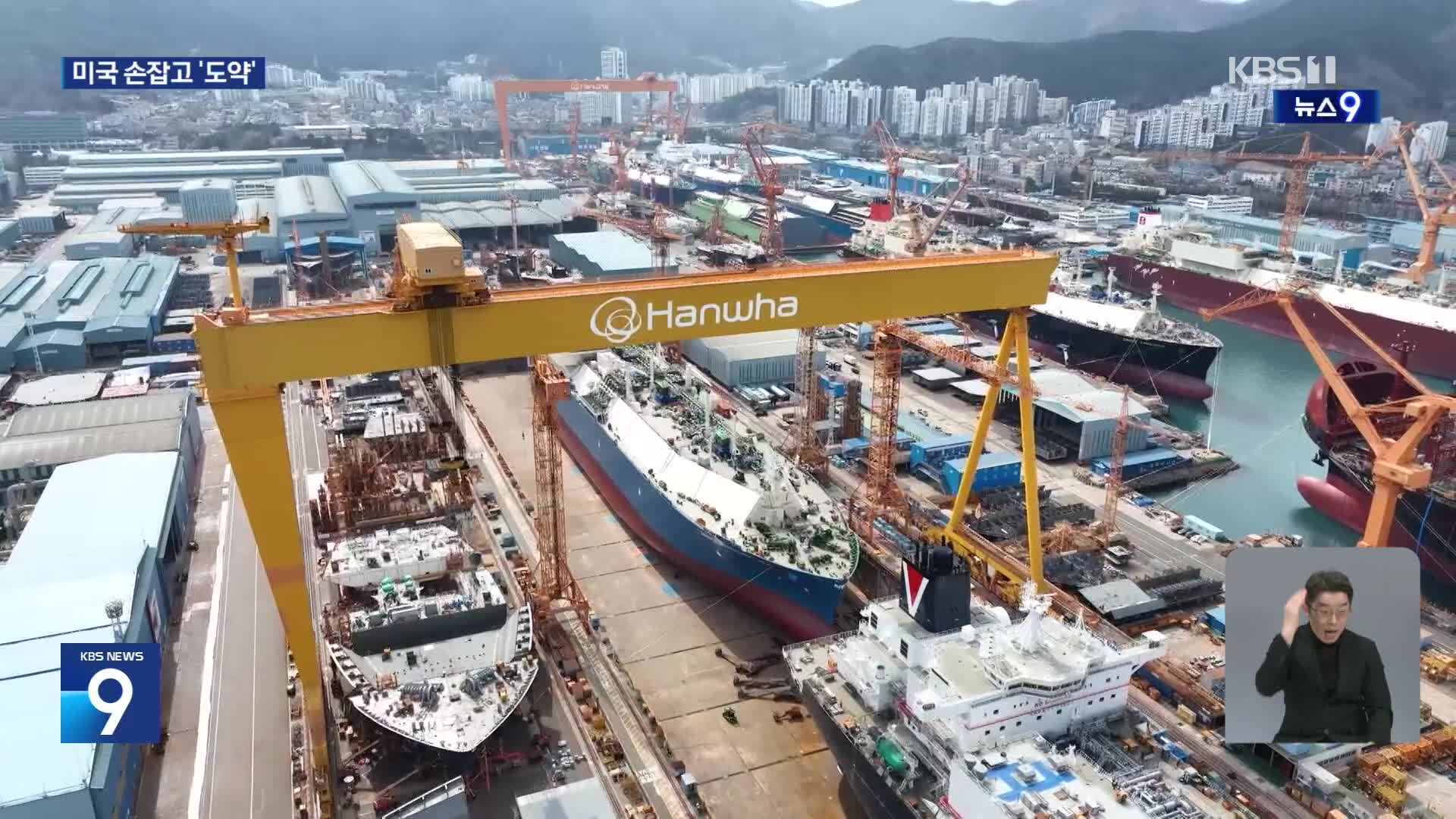[Anchor]
Now, let's take a look at the South Korean shipbuilding industry.
The MASGA, a Korea-U.S. cooperation initiative, has yet to release specific plans.
However, it is clear that this could be an opportunity to turn the tide for our shipbuilding industry.
Reporter Lee Jae-hee has more.
[Report]
Just before the announcement of the tariff negotiations between Korea and the U.S., senior U.S. officials visited the Philly shipyard in Philadelphia acquired by Hanwha.
With production costs less than half of those in the U.S., significantly higher production volumes, and accurate delivery schedule predictions, it is reported that President Trump decided to finalize the tariff negotiations only after hearing their reports.
President Trump has repeatedly promised to rebuild the U.S. shipbuilding industry.
[Trump/President of the United States: "We are going to be spending a lot of money on shipbuilding. We are way, way, way behind."]
It is expected that the U.S. will order more than 400 ships by 2037, which is impossible to fulfill solely with U.S. capabilities.
Even if we fill just a portion of this, it could be a turning point for the domestic shipbuilding industry.
[Kim Yong-hwan/Professor, Department of Naval Architecture and Ocean Engineering, Seoul National University: "Korean shipbuilders can maintain much more influence in the U.S. shipbuilding market by helping the U.S. shipbuilding industry."]
This year, as the U.S. has strengthened its measures against China by imposing port fees on Chinese ships, global orders for Chinese vessels have decreased, allowing our industry to recover a 20% market share and enjoy a windfall.
China is also wary of whether the Korea-U.S. shipbuilding cooperation 'MASGA' will bolster this trend.
However, the severe shortage of personnel and facilities in the U.S. poses a problem, as it takes too much time and investment for cooperation to yield results.
[Lee Eun-chang/Research Fellow, Korea Institute for Industrial Economics and Trade: "Building governance will be important. Given the large scale of the fund, we need to divide roles effectively. It seems necessary to specify the larger strategy."]
Various U.S. domestic laws requiring that all ships used in the U.S. be made in the U.S. also pose obstacles, which will need to be addressed through further negotiations with the U.S. in the future.
This is KBS News, Lee Jae-hee.
Now, let's take a look at the South Korean shipbuilding industry.
The MASGA, a Korea-U.S. cooperation initiative, has yet to release specific plans.
However, it is clear that this could be an opportunity to turn the tide for our shipbuilding industry.
Reporter Lee Jae-hee has more.
[Report]
Just before the announcement of the tariff negotiations between Korea and the U.S., senior U.S. officials visited the Philly shipyard in Philadelphia acquired by Hanwha.
With production costs less than half of those in the U.S., significantly higher production volumes, and accurate delivery schedule predictions, it is reported that President Trump decided to finalize the tariff negotiations only after hearing their reports.
President Trump has repeatedly promised to rebuild the U.S. shipbuilding industry.
[Trump/President of the United States: "We are going to be spending a lot of money on shipbuilding. We are way, way, way behind."]
It is expected that the U.S. will order more than 400 ships by 2037, which is impossible to fulfill solely with U.S. capabilities.
Even if we fill just a portion of this, it could be a turning point for the domestic shipbuilding industry.
[Kim Yong-hwan/Professor, Department of Naval Architecture and Ocean Engineering, Seoul National University: "Korean shipbuilders can maintain much more influence in the U.S. shipbuilding market by helping the U.S. shipbuilding industry."]
This year, as the U.S. has strengthened its measures against China by imposing port fees on Chinese ships, global orders for Chinese vessels have decreased, allowing our industry to recover a 20% market share and enjoy a windfall.
China is also wary of whether the Korea-U.S. shipbuilding cooperation 'MASGA' will bolster this trend.
However, the severe shortage of personnel and facilities in the U.S. poses a problem, as it takes too much time and investment for cooperation to yield results.
[Lee Eun-chang/Research Fellow, Korea Institute for Industrial Economics and Trade: "Building governance will be important. Given the large scale of the fund, we need to divide roles effectively. It seems necessary to specify the larger strategy."]
Various U.S. domestic laws requiring that all ships used in the U.S. be made in the U.S. also pose obstacles, which will need to be addressed through further negotiations with the U.S. in the future.
This is KBS News, Lee Jae-hee.
■ 제보하기
▷ 카카오톡 : 'KBS제보' 검색, 채널 추가
▷ 전화 : 02-781-1234, 4444
▷ 이메일 : kbs1234@kbs.co.kr
▷ 유튜브, 네이버, 카카오에서도 KBS뉴스를 구독해주세요!
- Chance for Korean shipbuilders
-
- 입력 2025-08-06 00:30:39

[Anchor]
Now, let's take a look at the South Korean shipbuilding industry.
The MASGA, a Korea-U.S. cooperation initiative, has yet to release specific plans.
However, it is clear that this could be an opportunity to turn the tide for our shipbuilding industry.
Reporter Lee Jae-hee has more.
[Report]
Just before the announcement of the tariff negotiations between Korea and the U.S., senior U.S. officials visited the Philly shipyard in Philadelphia acquired by Hanwha.
With production costs less than half of those in the U.S., significantly higher production volumes, and accurate delivery schedule predictions, it is reported that President Trump decided to finalize the tariff negotiations only after hearing their reports.
President Trump has repeatedly promised to rebuild the U.S. shipbuilding industry.
[Trump/President of the United States: "We are going to be spending a lot of money on shipbuilding. We are way, way, way behind."]
It is expected that the U.S. will order more than 400 ships by 2037, which is impossible to fulfill solely with U.S. capabilities.
Even if we fill just a portion of this, it could be a turning point for the domestic shipbuilding industry.
[Kim Yong-hwan/Professor, Department of Naval Architecture and Ocean Engineering, Seoul National University: "Korean shipbuilders can maintain much more influence in the U.S. shipbuilding market by helping the U.S. shipbuilding industry."]
This year, as the U.S. has strengthened its measures against China by imposing port fees on Chinese ships, global orders for Chinese vessels have decreased, allowing our industry to recover a 20% market share and enjoy a windfall.
China is also wary of whether the Korea-U.S. shipbuilding cooperation 'MASGA' will bolster this trend.
However, the severe shortage of personnel and facilities in the U.S. poses a problem, as it takes too much time and investment for cooperation to yield results.
[Lee Eun-chang/Research Fellow, Korea Institute for Industrial Economics and Trade: "Building governance will be important. Given the large scale of the fund, we need to divide roles effectively. It seems necessary to specify the larger strategy."]
Various U.S. domestic laws requiring that all ships used in the U.S. be made in the U.S. also pose obstacles, which will need to be addressed through further negotiations with the U.S. in the future.
This is KBS News, Lee Jae-hee.
Now, let's take a look at the South Korean shipbuilding industry.
The MASGA, a Korea-U.S. cooperation initiative, has yet to release specific plans.
However, it is clear that this could be an opportunity to turn the tide for our shipbuilding industry.
Reporter Lee Jae-hee has more.
[Report]
Just before the announcement of the tariff negotiations between Korea and the U.S., senior U.S. officials visited the Philly shipyard in Philadelphia acquired by Hanwha.
With production costs less than half of those in the U.S., significantly higher production volumes, and accurate delivery schedule predictions, it is reported that President Trump decided to finalize the tariff negotiations only after hearing their reports.
President Trump has repeatedly promised to rebuild the U.S. shipbuilding industry.
[Trump/President of the United States: "We are going to be spending a lot of money on shipbuilding. We are way, way, way behind."]
It is expected that the U.S. will order more than 400 ships by 2037, which is impossible to fulfill solely with U.S. capabilities.
Even if we fill just a portion of this, it could be a turning point for the domestic shipbuilding industry.
[Kim Yong-hwan/Professor, Department of Naval Architecture and Ocean Engineering, Seoul National University: "Korean shipbuilders can maintain much more influence in the U.S. shipbuilding market by helping the U.S. shipbuilding industry."]
This year, as the U.S. has strengthened its measures against China by imposing port fees on Chinese ships, global orders for Chinese vessels have decreased, allowing our industry to recover a 20% market share and enjoy a windfall.
China is also wary of whether the Korea-U.S. shipbuilding cooperation 'MASGA' will bolster this trend.
However, the severe shortage of personnel and facilities in the U.S. poses a problem, as it takes too much time and investment for cooperation to yield results.
[Lee Eun-chang/Research Fellow, Korea Institute for Industrial Economics and Trade: "Building governance will be important. Given the large scale of the fund, we need to divide roles effectively. It seems necessary to specify the larger strategy."]
Various U.S. domestic laws requiring that all ships used in the U.S. be made in the U.S. also pose obstacles, which will need to be addressed through further negotiations with the U.S. in the future.
This is KBS News, Lee Jae-hee.
-
-

이재희 기자 leej@kbs.co.kr
이재희 기자의 기사 모음
-
이 기사가 좋으셨다면
-
좋아요
0
-
응원해요
0
-
후속 원해요
0












![[단독] “‘런종섭’은 모욕”이라더니…전임대사 있는데도 긴급 출국](/data/layer/904/2025/08/20250805_90BOlq.png)


이 기사에 대한 의견을 남겨주세요.